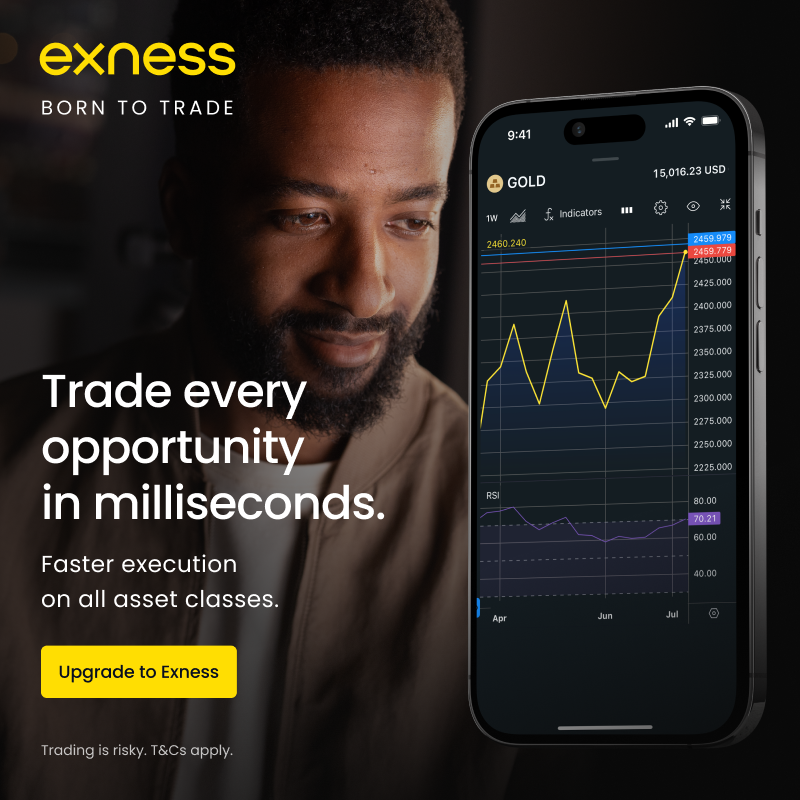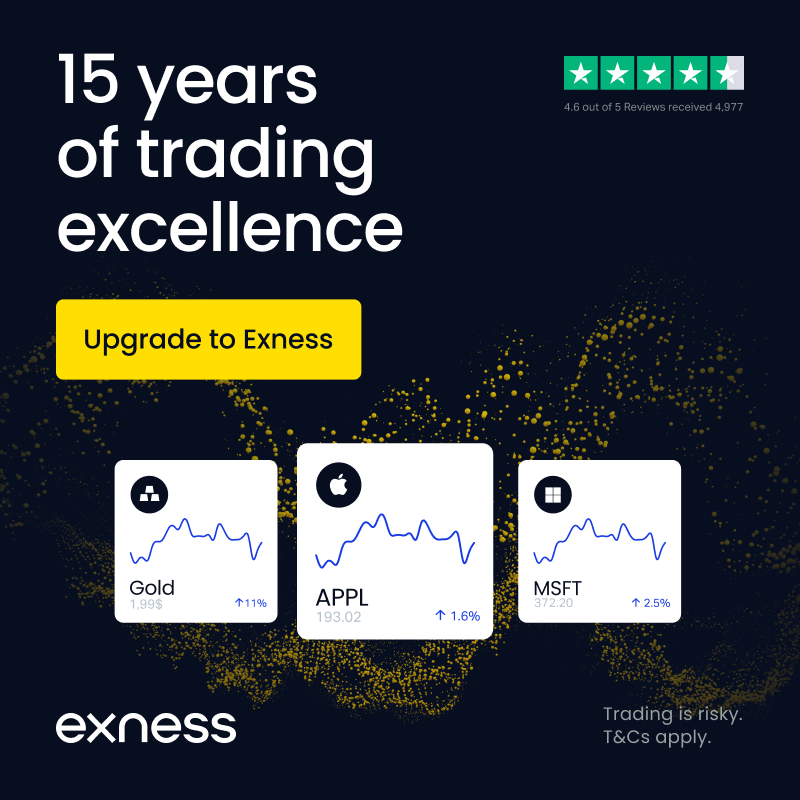
8 minute read
Exness vs Admiral Markets: Which Broker Is Better?
from Exness
by Exness Blog
Choosing the right forex broker can make or break your trading journey. If you’re torn between Exness vs Admiral Markets, you’re not alone—both are popular, well-regulated brokers with unique strengths. So, which one is better? It depends on your trading style, goals, and priorities. In this article, we’ll dive into a head-to-head comparison of Exness and Admiral Markets, covering fees, platforms, regulation, trading instruments, and more to help you decide which broker suits you best. Let’s get started!

✅ Trade with Exness now: Open An Account or Visit Brokers 👈
A Quick Overview of Exness and Admiral Markets
Before we dive into the nitty-gritty, here’s a snapshot of both brokers:
· Exness: Founded in 2008, Exness is a global giant with over 800,000 active clients. It’s known for tight spreads, instant withdrawals, and a user-friendly proprietary app. Exness operates under multiple regulators, including the FCA (UK) and CySEC (Cyprus).
· Admiral Markets (Admirals): Established in 2001, Admiral Markets, now rebranded as Admirals in some regions, is a veteran broker with a strong reputation for transparency and diverse trading instruments. It’s regulated by top-tier authorities like the FCA, CySEC, and ASIC (Australia).
Both brokers are reliable, but their offerings cater to different types of traders. Let’s break it down step-by-step.
1. Regulation and Safety: Are Your Funds Secure?
When choosing a broker, safety is non-negotiable. You want to know your money is in good hands.
· Exness: Exness is regulated by multiple authorities, including the FCA, CySEC, and the Financial Services Authority (FSA) in Seychelles. It keeps client funds in segregated accounts and offers negative balance protection, ensuring you don’t lose more than your deposit. However, its Tier-1 licenses (FCA and CySEC) don’t accept retail clients in some regions, which might limit access for certain traders.
· Admiral Markets: Admirals boasts top-tier regulation from the FCA, CySEC, and ASIC, plus additional oversight from the Jordan Securities Commission (JSC). Like Exness, it segregates client funds and provides negative balance protection. Its longer track record (over 20 years) and public financial reporting (via its parent company, Admirals Group) add an extra layer of trust.
Verdict: Both brokers are highly regulated and safe. Admirals edges out slightly due to its ASIC regulation and longer industry presence, which may appeal to traders prioritizing top-tier oversight. Exness, however, is more accessible for global clients, especially in less-regulated regions.
2. Trading Platforms: Which One Feels Right?
Your trading platform is your gateway to the markets, so it needs to be intuitive and powerful.
· Exness: Exness supports MetaTrader 4 (MT4), MetaTrader 5 (MT5), and its proprietary Exness Trade App. The app is a standout, offering a sleek interface, real-time market analysis, and mobile trading convenience. It’s perfect for traders who want to manage trades on the go. Exness also offers social trading, allowing you to copy strategies from experienced traders.
· Admiral Markets: Admirals also supports MT4 and MT5 but takes it up a notch with its MetaTrader Supreme Edition, a proprietary plugin that adds advanced tools like a correlation matrix and market sentiment indicators. This makes it ideal for traders who rely on in-depth analysis. Admirals’ mobile app is robust, with charting tools and easy trade management.
Verdict: Exness wins for beginners and mobile traders thanks to its user-friendly Exness Trade App. Admirals is better for experienced traders who want advanced tools via MetaTrader Supreme Edition.
3. Fees and Spreads: Which Broker Saves You Money?
Trading costs can eat into your profits, so let’s compare fees and spreads.
· Exness: Exness is known for its competitive, variable spreads, often tighter than the industry average. For example, its Pro account offers raw spreads as low as 0.21 pips on EUR/USD with a $7 per lot commission on RAW accounts. Standard accounts have no commission but slightly wider spreads. Exness doesn’t charge deposit, withdrawal, or inactivity fees, making it cost-effective for active traders.
· Admiral Markets: Admirals also offers variable spreads, starting at 0.2 pips on major pairs like EUR/USD, with a $3 per lot commission on Zero.MT4 accounts. Standard accounts have no commission but higher spreads (e.g., 0.6 pips for S&P 500 CFDs). There’s no deposit fee, but withdrawals may incur a small fee (e.g., €1 for bank transfers). A €10 monthly inactivity fee kicks in after two years.
Verdict: Exness takes the lead for low-cost trading, especially with its zero-fee policy for deposits and withdrawals and tighter raw spreads. Admirals is competitive but slightly more expensive due to withdrawal and inactivity fees.

✅ Trade with Exness now: Open An Account or Visit Brokers 👈
4. Trading Instruments: Diversity Matters
A broker’s range of instruments determines how much you can diversify your portfolio.
· Exness: Exness offers a solid but somewhat limited range of instruments, including forex, gold, silver, CFDs, oil, stocks, indices, metals, energies, cryptocurrencies, and commodities. Its crypto offerings include popular assets like Bitcoin, Ethereum, and Ripple, with swap-free trading available. However, its total tradeable symbols are under 250, which is narrower than some competitors.
· Admiral Markets: Admirals shines with over 8,000 instruments, including forex, CFDs on stocks, indices, commodities, ETFs, bonds, and cryptocurrencies. It offers more than 20 crypto CFDs, including Bitcoin, Ethereum, Cardano, and Dogecoin. This extensive range makes it ideal for traders looking to explore multiple markets.
Verdict: Admirals wins hands-down for instrument diversity, catering to traders who want access to a broader range of markets. Exness is sufficient for forex and crypto traders but lacks the same depth.
5. Account Types: Flexibility for All Traders
Different account types cater to different trading styles and experience levels.
· Exness: Exness offers a variety of accounts, including Standard, Standard Cent (great for beginners with small deposits), Pro, Zero, and Raw Spread accounts. There’s no minimum deposit for most accounts, making it accessible for new traders. The Pro account is popular for its balance of low spreads and no commission, while Raw Spread accounts cater to high-frequency traders.
· Admiral Markets: Admirals provides Trade.MT4, Zero.MT4, and Trade.MT5 accounts. The minimum deposit is $100-$200, depending on the account type, which is higher than Exness. Zero.MT4 accounts are suited for scalpers with low spreads and commissions, while Trade.MT5 accounts support multi-asset trading.
Verdict: Exness is more beginner-friendly with no minimum deposit and a cent account option. Admirals is better for traders who can meet the higher deposit threshold and want advanced account features.
6. Customer Support: Who’s Got Your Back?
Reliable support is crucial when you hit a snag.
· Exness: Exness offers 24/7 support via phone, live chat, and email in 14 languages. Its AI assistant is functional, and withdrawal approvals are lightning-fast (within 1 minute). However, some users report slow ticket resolution for complex issues.
· Admiral Markets: Admirals provides responsive support through live chat, email, and phone, with a strong reputation for quick verification (documents reviewed within two days). Its copy trading system and MQL5 Community integration are also user-friendly, enhancing the overall experience.
Verdict: Both brokers offer solid support, but Admirals slightly edges out due to faster issue resolution and a more comprehensive support system.
7. Education and Resources: Learning to Trade Better
Education can give you an edge, especially if you’re new to trading.
· Exness: Exness provides a learning center with beginner guides, technical analysis, and trading strategy resources. While helpful, its content is less extensive compared to industry leaders. It could improve by adding webinars and more advanced materials.
· Admiral Markets: Admirals excels with a robust educational platform, including webinars, video lessons, and in-depth articles. Its MetaTrader Supreme Edition also offers advanced tools like market sentiment and correlation matrices, which are great for strategic trading.
Verdict: Admirals is the clear winner for education, offering more comprehensive and interactive resources for traders of all levels.
8. Crypto Trading: Which Broker Is Better?
Crypto trading is a hot topic, so let’s see how these brokers stack up.
· Exness: Exness offers swap-free crypto trading on assets like Bitcoin, Ethereum, Litecoin, and Ripple. Its mobile app and Terminal platform make crypto trading seamless, with floating spreads that adjust to market conditions.
· Admiral Markets: Admirals provides over 20 crypto CFDs, including Bitcoin, Ethereum, Cardano, and Dogecoin, available on MT4 and MT5. Its low, stable spreads and 24/7 market access make it a strong choice for crypto traders.
Verdict: Admirals has a slight edge due to its broader crypto CFD selection, but Exness is competitive with its swap-free trading and mobile app convenience.
Final Thoughts: Which Broker Should You Choose?
So, Exness or Admiral Markets? Here’s the bottom line:
· Choose Exness if you’re a beginner or high-frequency trader looking for low spreads, no minimum deposit, and instant withdrawals. Its user-friendly Exness Trade App and flexible account types make it ideal for those starting out or trading on a budget.
· Choose Admiral Markets if you’re an experienced trader who values a wide range of instruments, advanced platforms like MetaTrader Supreme Edition, and robust educational resources. Its higher minimum deposit and diverse markets suit traders with more capital and a long-term investment approach.
Both brokers are reliable, regulated, and cater to different needs. Test their demo accounts to see which platform feels right for you. Ultimately, the best broker is the one that aligns with your trading style and goals. Happy trading!
✅ Trade with Exness now: Open An Account or Visit Brokers 👈
Read more:

